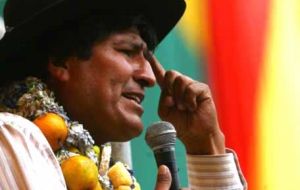MercoPress. South Atlantic News Agency
Morales promises a tighter state control economy for “post-colonial” Bolivia
 Indigenous symbols and colours marked the ceremony but also Morales political brand
Indigenous symbols and colours marked the ceremony but also Morales political brand Bolivian President Evo Morales began his second consecutive term on Friday vowing to fight poverty, further tighten state control over the economy and develop some of the world's largest lithium reserves.
Morales, Bolivia's first indigenous president, won a sweeping 64% re-election victory in December on the back of broad support from the poor Indian majority which also ensured him a majority control of both houses.
Contrary to Morales first inauguration in 2006 the ceremony was more colourful and ethnic-symbolized according to the multi-cultural emphasis President Morales has insisted as part of the process he calls the re-foundation of Bolivia, which means turning the page of colonial legacy.
One of the outstanding symbols at the event were the presidential sash and medallion, in accordance with the new constitution, which were handed to Morales by the president of the now denominated Pluri-national Legislative Assembly (and Bolivian vice-president) Alvaro García Linera.
For the first time since 1825 the presidential sash, next to the Bolivian crest, has a cockade with the “whipala” colours belonging to the indigenous peoples of the country.
The replaced traditional sash and medallion were deposited at Government House and will later be taken to a Central Bank vault for custody.
Morales was dressed in a dark suit, white shirt, no tie and a vest with colours and motives inspired in the “tiahuanacota” pre-Inca culture, considered the mother of all the different indigenous peoples of the Andes highlands.
The day before Morales had been enthroned, during a mystic indigenous ceremony at a “tiahuanacota” citadel close to the capital La Paz, as the spiritual leader of the Bolivian peoples and handed the baton of command.
However at the Assembly Morales took the oath “in the name of the motherland and of the Bolivian people” with his left fist raised and the right fist on his heart, which identifies the members of his political party MAS, Movement towards Socialism.
In the speech that followed before the Pluri-national Legislative Assembly Morales promised to launch state-run paper, cement, dairy and drug companies and develop iron and lithium industries to help Bolivia export value-added products instead of raw materials. However he also reached out to foreign investors.
”We need a lot of money to industrialize lithium ... we're ready to negotiate (with foreign investors) to guarantee investments,“ Morales said in La Paz, at his inauguration attended by Venezuelan president Hugo Chavez, Ecuador’s Rafael Correa; Paraguay’s Fernando Lugo; Chile’s Michelle Bachelet and the heir to the Spanish throne Prince Felipe among others.
Morales, said Bolivia needed ”partners but not patrons or bosses.“
Bolivia has huge deposits of lithium but unlike neighbouring Argentina and Chile it does not exploit the metal. Lithium is used in the rechargeable batteries that power laptop computers and cell phones, and demand for the metal is expected to skyrocket once car makers start producing electric cars on a large scale.
After nationalizing energy, mining and telecommunication companies the Bolivian state now controls 28% of the economy, up from about 8% before Morales took office according to World Bank statistics. The government is targeting 40% state control over the economy, chiefly by launching more state companies.
Bolivia is South America's top exporter of natural gas, but Morales has failed to attract investment to increase output and corruption has hampered efforts by the state-run energy company to develop projects to produce natural-gas derivatives.
However, the nationalization of the natural gas industry brought a windfall that Morales tapped to fund social programs, which reach a quarter of Bolivia's 10 million people a year. Morales also vowed to continue to deepen rights for Bolivia's Indian poor.
”Comrades, democracy has been consolidated ... the colonial state has died and the multicultural state has been born,” he said.
Bolivian Indians make up around 70% of the population and have long complained of discrimination by a mixed-raced minority of Spanish descendents that had a stronghold on politics until Morales first became president in January 2006.
After winning a majority in both houses of Congress, the ruling party can now call for referendums to amend the constitution, and will control judicial appointments, which leaves right-wing parties with little power to oppose Morales.




Top Comments
Disclaimer & comment rulesCommenting for this story is now closed.
If you have a Facebook account, become a fan and comment on our Facebook Page!